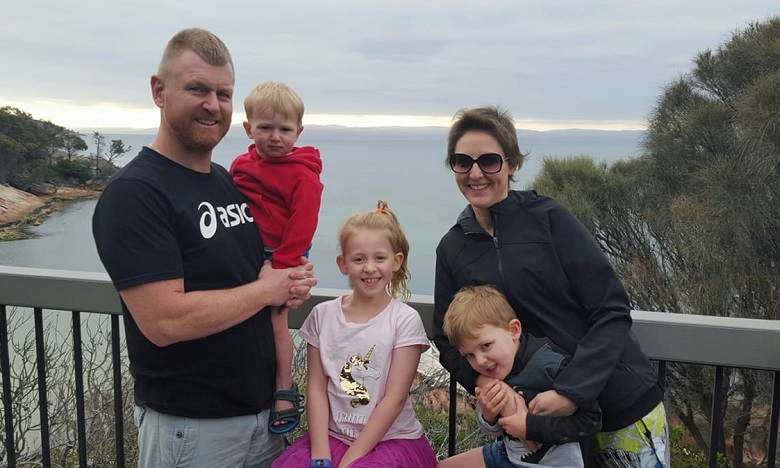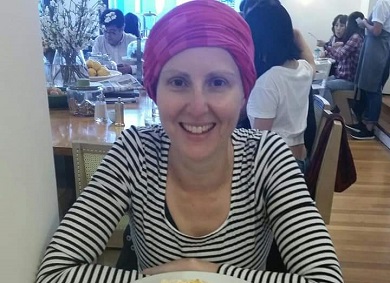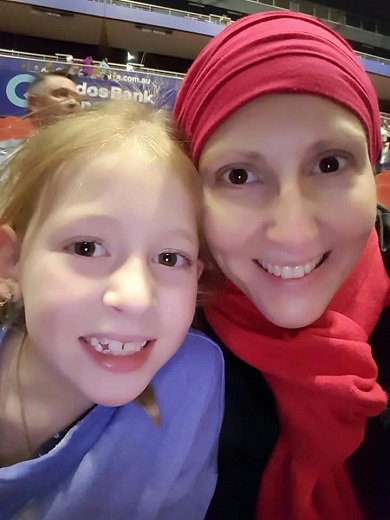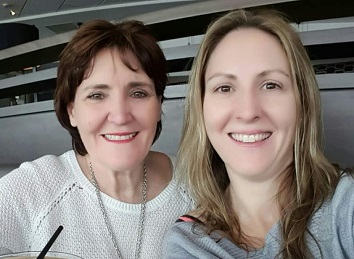The scary reality: blood cancer can affect anyone at any time
When Hayley Bugno was diagnosed with blood cancer only a year after having her third baby, she was confronted with the ‘scary reality’ that the disease does not discriminate and can strike when least expected.

Hayley was just 35 years old and still breastfeeding her youngest son at the time of her diagnosis in 2018.
“I was on maternity leave and just doing my thing as a busy mum,” said the Sydney local.
“I then started getting exhausted, had some unusual bruising, nosebleeds and some flu-like symptoms.
“I went to the doctor who prescribed a double course of antibiotics and sent me on my way.”

But the antibiotics didn’t work and with a strange rash developing all over her body, Hayley went to a dermatologist who ordered blood tests.
“I was actually in Griffith at the time, six hours west of Sydney, when I was told I had blood cancer,” she said.
“I was sent back to Sydney the next day to see a haematologist and have a bone marrow biopsy which confirmed my diagnosis as acute myeloid leukaemia (AML).”
Acute myeloid leukaemia (AML) is a type of cancer that affects the blood and bone marrow with an overproduction of immature white blood cells, called myeloblasts or leukaemic blasts.
Hayley had four rounds of high-dose chemotherapy over the next five months involving month-long stints in hospital with a week break at home.
“They wanted to try and smash it out of the park to avoid a stem cell transplant, as they could see I had odd bone marrow and it would be difficult to find a donor match,” she said.
“The treatment is weird because you’re having it to make you better, but it does so by making you incredibly sick.
“I hit remission after my first month of treatment, but I was just skin and bone and had major gut issues.
“You’re super susceptible to infections when you’re having treatment and so they have to pump you full of antibiotics.
“I then ended up with sepsis which was the scariest part of treatment, and it was a miracle I stayed out of intensive care.”
Sepsis occurs when chemicals released in the bloodstream to fight an infection trigger inflammation throughout the body and damage multiple organ systems, leading them to fail, sometimes even resulting in death.
Being separated from her children during treatment was a huge challenge for Hayley.

“I had to stop breast-feeding my then one-year-old, Aidan,” she said.
“Sometimes he would come to visit me in hospital and not even want me – that was pretty heartbreaking.”
Hayley also had two other young children at home: her daughter, Sienna, who was seven at the time, and older son, Callan who was four.
“My husband, Brent, did the best he could but it’s tough not being there to run the household as mum,” said Hayley.
Throughout her treatment Hayley found practical and transport support at the Leukaemia Foundation.
“We were given grocery vouchers, which were a great help in that time, but the main thing was getting help with transport,” said Hayley
“For some appointments, I needed to be driven to the hospital, but Brent had to be home to care for the children.
“We were so grateful to get that support as taxis are so expensive and it would’ve added up quickly.”
Hayley has now been blood cancer free for three years, but her diagnosis has had a big impact on not only herself, but her friends.
“They’ve done some incredible fundraising for the Leukaemia Foundation, taking part in World’s Greatest Shave and Dry July for me,” said Hayley.
“You just don’t think it could happen to you in a million years.
“I remember looking around the ward one day and thinking how random it was these people were ‘picked’ to have blood cancer.
“I was in my mid 30’s, not a smoker and eating healthily – you feel like you’re the most unlikely candidate.”

Hayley is grateful to have come through her journey with her health but knows there is more to be done for other families who aren’t so lucky.
“I was very excited to see Leukaemia Foundation has committed to Zero Lives Lost to Blood Cancer by 2035,” she said.
“It’s just so important that the whole community continues to support the organisation so finding a cure is possible.”
Need support? We encourage you to find out about the different ways we can help by calling 1800 620 420 to speak with a Blood Cancer Support Coordinator.
Share your own blood cancer story
Every person touched by blood cancer has a unique and important story to tell. Stories are a powerful way to spread awareness of blood cancer, to inspire others going through a diagnosis and to encourage support from the wider community.